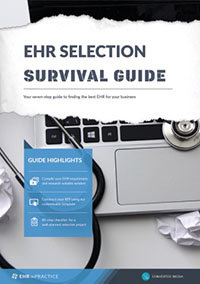How to select an EHR for practice management
The array of practice management software available on the market today offers a variety of features and functionalities. These features and functionalities can address the needs of healthcare organizations of all sizes and practice areas. With the wealth of options available, selection teams can find themselves faced with difficult choices when deciding on a practice management system that best meets their needs.
Just like selecting an EHR system, the process of selecting practice management software will be guided by their organization’s unique requirements. Even though each practice will have its own unique requirements one can still rely on a general set of considerations that can be used to guide the selection process. Among these considerations, one can think of two primary areas; software design and features.
Software design: integrated or stand-alone
One of the basic considerations selection teams will face when considering practice management systems involves deciding between stand-alone or integrated practice management software. Stand-alone practice management software is offered as its own product and must be combined with compatible EHR products. Whereas, integrated practice management software is offered as part of an EHR software package or as an optional add on. Besides the practical benefits of only being required to manage one system and one vendor, the most compelling reason for selecting a fully integrated practice management system involves the removal of barriers to data sharing and analysis within a practice. In effect, data can be collected and analyzed in a seamless manner.
Although many practices can function quite well without a fully integrated practice management solution there are a number of compelling reasons why one should select a fully integrated EHR and practice management solution. An integrated EHR solution can allow administrators and clinical staff to monitor and analyze various metrics across their organization. In this context, a fully integrated practice management solution can allow seamless coordination of business between departments and locations in areas such as staffing, billing and inventory management.
Practice management features
The features that are available in most practice management products today range from basic to more advanced features that rival those found in management or customer relations software outside the health care industry. The array of practice management products can allow an organization to better plan and manage its operations.
Common practice management features include provider scheduling, medical billing, online patient portal, ePrescribing, billing, patient check-in, and financial reporting and benchmarking, among others. Practices considering practice management software should also consider many practice management software vendors offer highly advanced products that can provide administrators with a wide array of monitoring and analytic tools. Advanced practice management features can provide both the ability to address historical and present data but can also provide features that allow the ability to engage in predictive modeling and forecasting particularly in the area of an organization’s finances.
What features a practice eventually decides on as part of their requirements list will depend on individual circumstances. However, the process in which a practice decides on a practice management system to deploy will be general to all settings.
Free white paper

EHR Selection Checklist
Over 100 actionable steps to EHR selection success

Featured white papers
Related articles
-

5 key stakeholders in your EHR selection
Learn about the individuals that, when consulted early and often, can make your EHR selection pro...
-

5 important areas of EHR training during implementation
Successful EHR implementation is not possible without crucial EHR training
-

The most important EHR features for practice management
The key functionalities any practice management software should have



